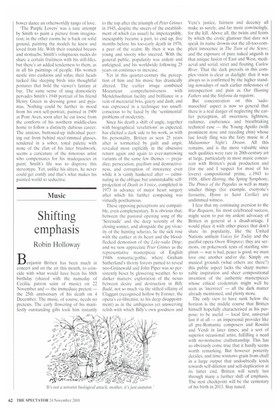Shifting emphasis
Robin Holloway
Benjamin Britten has been much in concert and on the air this month, to coincide with what would have been his 88th birthday (shared with the nameday of Cecilia, patron saint of music) on 22 November and — the immediate pretext — the 25th anniversary of his death on 4 December. The music, of course, needs no pretexts. The early flowering of his manifestly outstanding gifts took him instantly to the top after the triumph of Peter Grimes in 1945, despite the sneers of the establishment of which (as usual) he imperceptibly, inescapably became a part, to end up, five months before his too-early death in 1976, a peer of the realm. By then it was the young and snooty who sneered. With the general public, popularity was ardent and unfeigned, and his worldwide following 25 years on continues to increase.
Yet in this quarter-century the perception of him and his music has drastically altered. The earlier image combined Mozartean comprehensiveness with Mendelssohnian facility and brilliance in a vein of mercurial brio, gaiety and dash, and was expressed in a technique too unselfconscious to be fazed by the 'sentimental' problems of modernity.
Since his death a shift of angle, together with biographical 'revelations' as expected, has elicited a dark side to his work, as with his personality. Britten as seen 25 years after is tormented by guilt and angst, revealed most explicitly in the obsessive return again and again to ever-narrowing variants of the same few themes — prejudice, persecution, pacifism and destructiveness, and corruption of innocence even while it is vainly hankered after — culminating in the oblique but unmistakable selfprojection of Death in Venice, completed in 1973 in advance of major heart surgery after which his further composing was virtually posthumous.
These opposing perceptions are compatible, even complementary. It is obvious that, between the pastoral opening song of the 'Serenade' and the deep serenity of the closing sonnet, and alongside the gay vivacity of the hunting scherzo, lie the sick rose with the canker at its heart and the bloodflecked demonism of the Lyke-wake Dirge; and we now appreciate Peter Grimes as the representative masterpiece of English 1940s romantic/gothic, where Graham Sutherland's thorny forests parted to reveal neo-Grunewald and John Piper was so persistently beset by glowering weather. Sc) to darker matters: exploration of the nexus between desire and destruction in Billy Budd, not so much via the stilted villainy of Claggart (recognised hollow by Forster, the opera's co-librettist, to his deep disappointment) as in the ambiguous yet unswerving relish with which Billy's own goodness and Vere's justice, fairness and decency all make as surely, and far more convincingly, for the kill. Above all, the twists and feints by which the erotic glamour that dare not speak its name drowns out the all-too-complicit innocence in The Turn of the Screw; and the exposure of pure naked anguish in that unique fusion of East and West, mediaeval and serial, strict and floating, Curlew River. That the dark prevails in this complex vision is clear as daylight: that it was always so is confirmed by the higher standing nowadays of such earlier milestones of introspection and pain as Our Hunting Fathers and the Sinfonia da requiem.
But concentration on this 'sadomasochist' aspect is now so general that there is a real danger of neglecting the earlier perception, all sweetness, lightness, radiance, exuberance and breathtaking technical ease — the Young Apollo (with prominent nose and receding chin) whose last lovely fling was the fairy music in A Midsummer Night's Dream. All this remains, and is the more valuable since such qualities were rare in 20th-century art at large, particularly in most music concurrent with Britten's peak production and (for me and 1 suspect for most of his lovers) compositional prime, c. 1943 to 1958. Albert Herring, the Spring Symphony, The Prince of the Pagodas as well as many smaller things (for example, everyone's favourite, Hymn to Saint Cecilia) are undimmed witness.
I fear that my continuing aversion to the War Requiem, his most celebrated success, might seem to put my ardent advocacy of Britten in general at a disadvantage. I would place it with other pieces that don't share its popularity, like the United Nations anthem Voices for Today and the pacifist opera Owen Wingrave; they are sermons, on pokerwork texts of startling sirnplism — war is bad, peace is good, we must love one another and/or die. Simply on musical grounds (what others are there?) this public aspect lacks the sharp memorable inspiration and sheer compositional invention of the authentic masterpieces whose ethical credentials might well be seen as 'incorrect' — all the dark matter already mentioned, and plenty more.
The only view to have sunk below the horizon is the middle course that Britten himself hopefully characterised as his purpose: to be useful — local first, universal last if at all an impersonal provider like all pre-Romantic composers and Rossini and Verdi in later times; and a sort of superior occasional artist, fulfilling a need with no-nonsense craftsmanship. This has so obviously come true that it hardly seems worth remarking. But however posterity decides, and time winnows grain from chaff in a large output that undoubtedly tends towards self-dilution and self-duplication at its latter end. Britten will surely last through many a further shift of emphasis. The next checkpoint will be the centenary of his birth in 2011 Stay tuned.


















































































 Previous page
Previous page